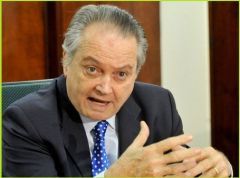 EL CENTRO DE ESTUDIOS ESTRATÉGICOS DE LA DEFENSA SE REALIZA UNA CONFERENCIA INTERNACIONAL.
EL CENTRO DE ESTUDIOS ESTRATÉGICOS DE LA DEFENSA SE REALIZA UNA CONFERENCIA INTERNACIONAL.
BUENOS AIRES (20 MAY 11 El ministro de Defensa, Arturo Puricelli, disertará en la sesión inaugural del Centro de Estudios Estratégicos de la Defensa (CEED) que se desarrollará el jueves próximo en el Edificio Libertador, sede de la cartera. Este centro constituye la primera instancia de carácter permanente instituida por un órgano de la Unasur con representantes de todos los ministerios de Defensa de los países miembros. Durante dos jornadas en el marco de la conferencia internacional: “El Posicionamiento Estratégico de Suramérica en el Siglo XXI” se debatirá con los principales ministros de Defensa y representantes de la región. El CEED del Consejo de Defensa Suramericano, cuya sede funciona en Buenos Aires, fue creado a partir de la necesidad de consolidar una identidad suramericana en materia de Defensa y tiene como finalidad la construcción de una visión propia, orientada desde las necesidades específicas y el interés común de los países de la región.
Luego de la disertación del ministro
Puricelli el jueves próximo a las 14, harán lo propio Alfredo Forti, director
del CEED (además de Secretario de Estrategia y Asuntos Militares del Ministerio
de Defensa); Álvaro García Linera, vicepresidente del Estado Plurinacional de
Bolivia; y María Emma Mejía, secretaria general de Unasur. A las 16 comenzará el primer panel,
del que participarán: Samuel Pinheiro Guimaraes, representante general del
MERCOSUR; Raúl Rivera Andueza, presidente de la Fundación Foro Innovación,
Chile; y el analista internacional Juan Gabriel Tokatlian. Al término de estas
ponencias, ministros e invitados especiales reflexionarán sobre la temática.
El viernes comenzará a la 10 el segundo panel, en el que intervendrán: los ministros de Defensa de Brasil, Nelson Jobim; de Ecuador, Javier Ponce; de Perú, Jaime Thorne León; y el director del Centro de Estudios Nacionales e Internacionales (CENI), Luis Nicanor Bareiro Spaini.A las 12.30 se desarrollará una mesa
redonda con los ministros de Defensa de los países de Unasur moderada por
Germán Montenegro (director de la Escuela de Defensa Nacional) de la que se
sacarán conclusiones y lineamientos para el CEED.
Finalmente a las 13.30 el ministro
Puricelli clausurará la conferencia internacional que inaugura oficialmente el
CEED.
Fuente: Ministerio de Defensa.
















































